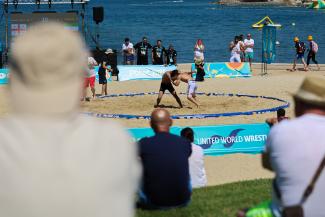Petriashvili to Wrestle for Second World Gold of 2017 and Third of Career
Saturday, November 25, 2017 - 15:00 By Taylor Miller
BYDGOSZCZ, Poland – Heavyweight power Geno PETRIASHVILI (GEO) is on track to win his second World title of the year, advancing to the 125 kg finals of freestyle competition at the U23 World Championships in Bydgoszcz, Poland.
Petriashvili, a six-time World medalist and 2016 Olympic bronze medalist, sailed to the finals, collecting three wins by technical fall and surrendering only one point in the first session.
The 2017 Senior World champion and 2013 Junior World champion will face two-time Junior European champion Magomedamin DIBIROV (RUS) in the gold-medal bout.
Dibirov impressed, knocking off two-time Junior World champion Amin Hossein TAHERI (IRI) in the semifinals, 12-1.
The other three finals are set up to be entertaining as well.
At 57 kg, six-time European Championships medalist Mikyay NAIM (BUL) will go up against 2017 Senior Pan American Championships bronze medalist Reineri Andreu ORTEGA (CUB).
2017 Senior World fifth-place finisher Rinya NAKAMURA (JPN) seeks his second World medal and first World title at 61 kg. Nakamura, a 2011 Cadet World bronze winner, will face Kuat AMIRTAYEV (KAZ), a 2017 Medved International bronze medalist.
2014 Junior World silver medalist and 2011 Cadet World bronze medalist Azamat DAULETBEKOV (KAZ) advanced to the 86 kg finals, looking for his third World medal at three different age groups.
He’ll go head-to-head with Intercontinental Cup champion Alikhan ZHABRAILOV (RUS).
The finals are set to begin at 6 p.m. local time (12 p.m. U.S. ET).
Finals matchups
57 kg
Gold - Mikyay Salim NAIM (BUL) vs. Reineri ANDREU ORTEGA (CUB)
Bronze - Zhandos ISMAILOV (KAZ) vs. Parviz IBRAHIMOV (AZE)
Bronze - Wanhao ZOU (CHN) vs. Suleyman ATLI (TUR)
61 kg
Gold - Rinya NAKAMURA (JPN) vs. Kuat AMIRTAYEV (KAZ)
Bronze - Mihai ESANU (MDA) vs. Sedat OZDEMIR (TUR)
Bronze - Husein SHAKHBANAU (BLR) vs. Islam DUDAEV (RUS)
86 kg
Gold - Alikhan ZHABRAILOV (RUS) vs. Azamat DAULETBEKOV (KAZ)
Bronze - Uri KALASHNIKOV (ISR) vs. Raman CHYTADZE (BLR)
Bronze - Irakli MTSITURI (GEO) vs. Lazaro Daniel HERNANDEZ LUIS (CUB)
125 kg
Gold - Geno PETRIASHVILI (GEO) vs. Magomedamin DIBIROV (RUS)
Bronze - Mihaly NAGY (HUN) vs. Amin Hossein TAHERI (IRI)
Bronze - Zhanxiang HU (CHN) vs. Danylo KARTAVYI (UKR)


Share your thoughts.
Comments